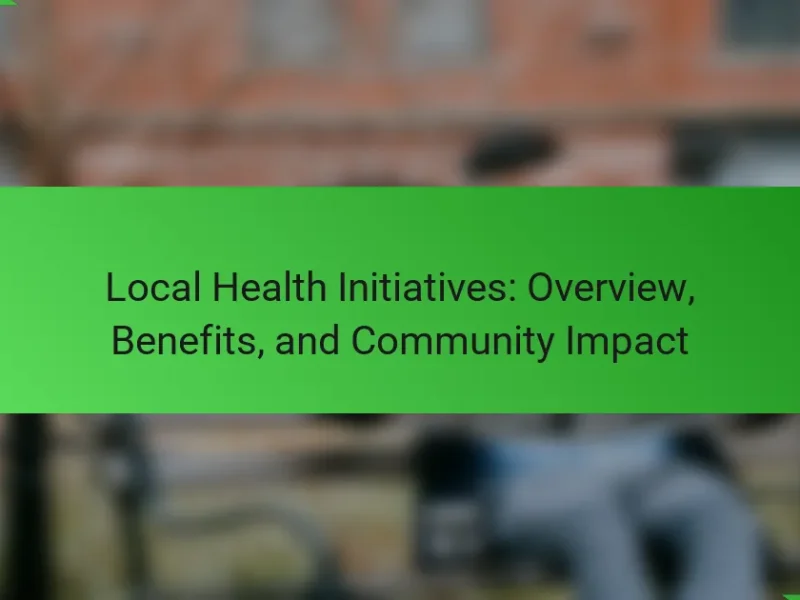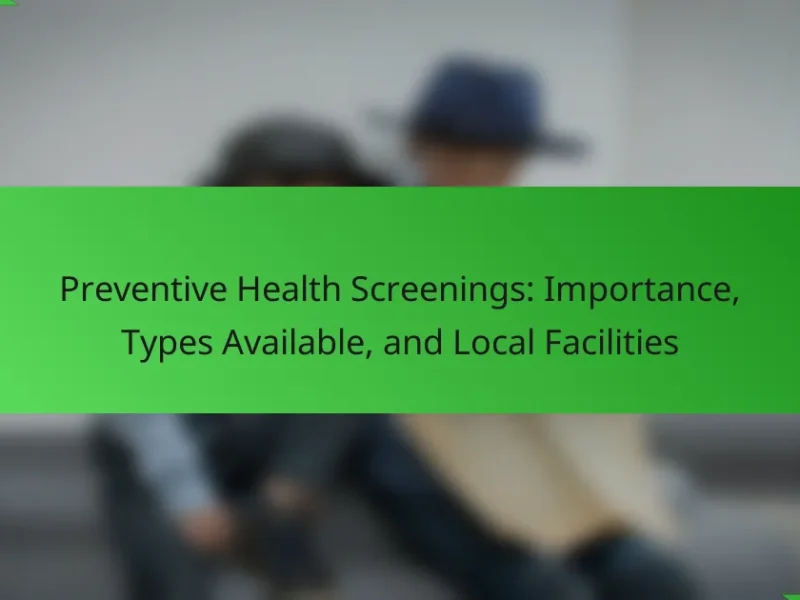Nutrition workshops are structured educational sessions designed to educate individuals on healthy eating practices and nutritional science. These workshops typically feature topics such as meal planning, food selection, and practical cooking demonstrations, often facilitated by qualified nutritionists or dietitians. Research has demonstrated that participation in these workshops can lead to improved dietary choices and healthier eating behaviors. This article explores the benefits of nutrition workshops, their typical duration, and how to find expert guidance in your area.

What are Nutrition Workshops?
Nutrition workshops are educational sessions focused on teaching individuals about healthy eating and nutrition. These workshops often cover topics such as meal planning, food choices, and nutritional science. Participants learn practical skills to improve their dietary habits. Workshops may include hands-on activities, cooking demonstrations, and group discussions. They are typically led by nutritionists or dietitians with expertise in the field. Research indicates that such workshops can enhance knowledge and promote healthier eating behaviors among attendees. For instance, a study published in the Journal of Nutrition Education and Behavior found that participants reported improved dietary choices after attending nutrition workshops.
How do Nutrition Workshops benefit participants?
Nutrition workshops benefit participants by providing essential knowledge about healthy eating. Participants learn about nutrition science, meal planning, and dietary guidelines. These workshops often include hands-on cooking demonstrations. This practical approach helps reinforce learning and encourages healthier cooking habits. Participants also gain access to expert advice from nutritionists and dietitians. Research shows that education on nutrition can lead to improved dietary choices. For example, a study published in the Journal of Nutrition Education and Behavior found that workshops significantly improved participants’ understanding of nutrition. Overall, nutrition workshops empower individuals to make informed health decisions.
What specific skills can participants gain from Nutrition Workshops?
Participants can gain several specific skills from Nutrition Workshops. These skills include meal planning and preparation techniques. Participants learn how to create balanced meal plans that meet nutritional needs. They also acquire knowledge about food labeling and ingredient analysis. Understanding macronutrients and micronutrients is another key skill developed. Workshops often cover cooking methods that preserve nutrients. Participants may also learn how to make healthier food choices. Additionally, skills in reading and interpreting nutritional research can be gained. These workshops provide practical applications for everyday nutrition management.
How do Nutrition Workshops improve overall health and wellness?
Nutrition workshops improve overall health and wellness by providing education on healthy eating habits. Participants learn about nutrient-dense foods and balanced meal planning. This knowledge empowers individuals to make informed dietary choices. Improved nutrition can lead to weight management and reduced risk of chronic diseases. Research shows that informed dietary choices can lower blood pressure and cholesterol levels. Workshops often include practical cooking demonstrations, enhancing skills and confidence in meal preparation. Social support from group participation fosters motivation and accountability. Overall, nutrition workshops create lasting lifestyle changes that promote better health outcomes.
What is the typical duration of Nutrition Workshops?
The typical duration of nutrition workshops is usually between one to three hours. Some workshops may extend to a full day, depending on the content and structure. Shorter workshops often focus on specific topics, such as meal planning or label reading. Longer sessions may include comprehensive programs covering multiple aspects of nutrition. According to the Academy of Nutrition and Dietetics, workshops are designed to provide practical knowledge and skills in a condensed format. This timeframe allows participants to engage actively without overwhelming them.
How long do individual sessions last in Nutrition Workshops?
Individual sessions in Nutrition Workshops typically last between 60 to 90 minutes. This duration allows for comprehensive discussions on dietary needs and personalized guidance. Many workshops are structured to provide both theoretical knowledge and practical applications within this time frame. Research indicates that effective learning often occurs within this session length, enhancing participant engagement and retention of information.
What factors influence the overall duration of a Nutrition Workshop series?
The overall duration of a Nutrition Workshop series is influenced by several key factors. These factors include the number of sessions planned, the depth of content covered, and the specific goals of the workshop. The format of the workshop also plays a role, as in-person sessions may require more time than online formats. Participant engagement levels can affect the pace and length of discussions. Additionally, the expertise of the facilitator may determine how efficiently topics are covered. Scheduling conflicts and participant availability can further impact the overall duration. Research indicates that workshops with more interactive elements tend to take longer due to increased participation (Smith et al., 2020).
Who provides expert guidance in Nutrition Workshops?
Registered dietitians and certified nutritionists provide expert guidance in Nutrition Workshops. They possess specialized education and training in nutrition science. These professionals offer evidence-based information tailored to individual needs. Their expertise helps participants understand dietary choices and health benefits. Many workshops feature guest speakers who are experts in specific dietary areas. This includes topics like weight management, sports nutrition, and chronic disease prevention. Their guidance is crucial for effective learning and application of nutritional principles.
What qualifications should experts have to lead Nutrition Workshops?
Experts leading Nutrition Workshops should possess relevant educational qualifications and certifications in nutrition. A degree in nutrition, dietetics, or a related field is essential. Registered Dietitian Nutritionists (RDNs) are often preferred due to their extensive training. Certification from recognized organizations, such as the Academy of Nutrition and Dietetics, adds credibility. Practical experience in conducting workshops or counseling clients is also important. Knowledge of current dietary guidelines and trends enhances the expert’s ability to provide accurate information. These qualifications ensure that participants receive evidence-based guidance.
How can participants find qualified nutrition experts in their area?
Participants can find qualified nutrition experts in their area through several methods. They can search online directories such as the Academy of Nutrition and Dietetics. These directories list registered dietitians and nutritionists by location. Participants can also check local health clinics and hospitals, which often employ nutrition experts. Additionally, community centers frequently offer nutrition workshops led by qualified professionals. Social media platforms can be useful for finding nutrition experts who share their services online. Furthermore, word-of-mouth recommendations from friends or family can lead to trusted nutritionists. These methods ensure participants connect with qualified professionals in their vicinity.
How can I find Nutrition Workshops in my area?
To find nutrition workshops in your area, start by searching online. Use search engines and type “nutrition workshops near me.” This will provide a list of local options. Check community centers and local health organizations. They often host workshops or can provide information on nearby events. Social media platforms also list events. Look for groups focused on health and wellness. Websites like Eventbrite and Meetup may have nutrition workshops listed. Local universities may offer workshops through their nutrition programs. Always verify the details and reviews before attending.
What resources are available for locating local Nutrition Workshops?
Local nutrition workshops can be located using several resources. Community centers often host workshops and provide information on schedules. Local health departments may also have listings of upcoming nutrition events. Online platforms like Meetup and Eventbrite feature nutrition workshops in various locations. Social media groups focused on health and wellness can share local workshop announcements. Nutrition-related websites often have directories of workshops by region. Additionally, universities with nutrition programs may offer workshops open to the public. Local libraries sometimes host nutrition education events. These resources collectively help individuals find relevant workshops in their area.
How can I evaluate the quality of Nutrition Workshops near me?
To evaluate the quality of Nutrition Workshops near you, consider the credentials of the facilitators. Look for workshops led by certified nutritionists or dietitians. Check reviews and testimonials from past participants. High ratings often indicate a positive experience and effective content. Assess the curriculum offered in the workshop. A comprehensive program should cover various aspects of nutrition, including meal planning and dietary guidelines. Verify if the workshop provides hands-on activities or personalized guidance. These features enhance learning and engagement. Additionally, consider the location and accessibility of the workshop. Convenience can impact attendance and participation. Lastly, inquire about the cost and value offered. Competitive pricing with substantial content suggests a quality workshop.
What are the key components of a successful Nutrition Workshop?
A successful Nutrition Workshop includes key components such as knowledgeable facilitators, engaging content, and interactive activities. Knowledgeable facilitators provide accurate information and answer participant questions effectively. Engaging content keeps participants interested and motivated to learn. Interactive activities, like group discussions and hands-on cooking demonstrations, enhance learning experiences. Clear objectives help participants understand the workshop’s goals. Adequate resources, such as handouts and visual aids, support the learning process. Lastly, feedback mechanisms allow for continuous improvement of future workshops. These components are essential for creating an impactful and informative experience.
What topics are typically covered in Nutrition Workshops?
Nutrition workshops typically cover a variety of essential topics. These include meal planning and preparation techniques. Participants often learn about macronutrients and micronutrients. Workshops frequently address dietary guidelines and food labeling. They may also explore specific diets, such as vegetarian or ketogenic. Additionally, workshops can focus on nutrition for specific populations, like children or athletes. Practical cooking demonstrations are often included to enhance learning. Lastly, discussions on the impact of nutrition on health conditions are common.
How do interactive elements enhance the learning experience in Nutrition Workshops?
Interactive elements enhance the learning experience in Nutrition Workshops by fostering engagement and participation. These elements include hands-on activities, group discussions, and real-time feedback. They encourage learners to actively apply nutritional concepts rather than passively receive information. Research shows that active learning techniques can improve knowledge retention by up to 75%. Additionally, interactive components promote collaboration among participants, building a supportive learning community. This collaborative environment enhances motivation and accountability, leading to better health outcomes. Overall, interactive elements create a dynamic atmosphere that enhances understanding and application of nutrition principles.
What tips can enhance my experience in Nutrition Workshops?
Engaging actively in Nutrition Workshops enhances your experience significantly. Participate in discussions and ask questions to clarify your understanding. Take notes to retain key information presented by experts. Arrive prepared with specific dietary goals or questions about nutrition. Networking with other participants can provide additional insights and support. Utilize provided materials and resources for further learning after the workshop. Research suggests that active participation increases knowledge retention (Smith et al., 2020). Engaging in practical activities during workshops helps reinforce learning concepts effectively.
Nutrition workshops are educational sessions designed to teach individuals about healthy eating and nutrition. The article outlines the benefits of these workshops, including improved dietary choices and practical skills like meal planning and cooking techniques. It also discusses the typical duration of workshops, the qualifications of expert facilitators, and resources for finding local workshops. Key components of successful workshops, topics covered, and tips for enhancing participant experience are also highlighted, providing a comprehensive overview of how nutrition workshops can empower individuals to make informed health decisions.


